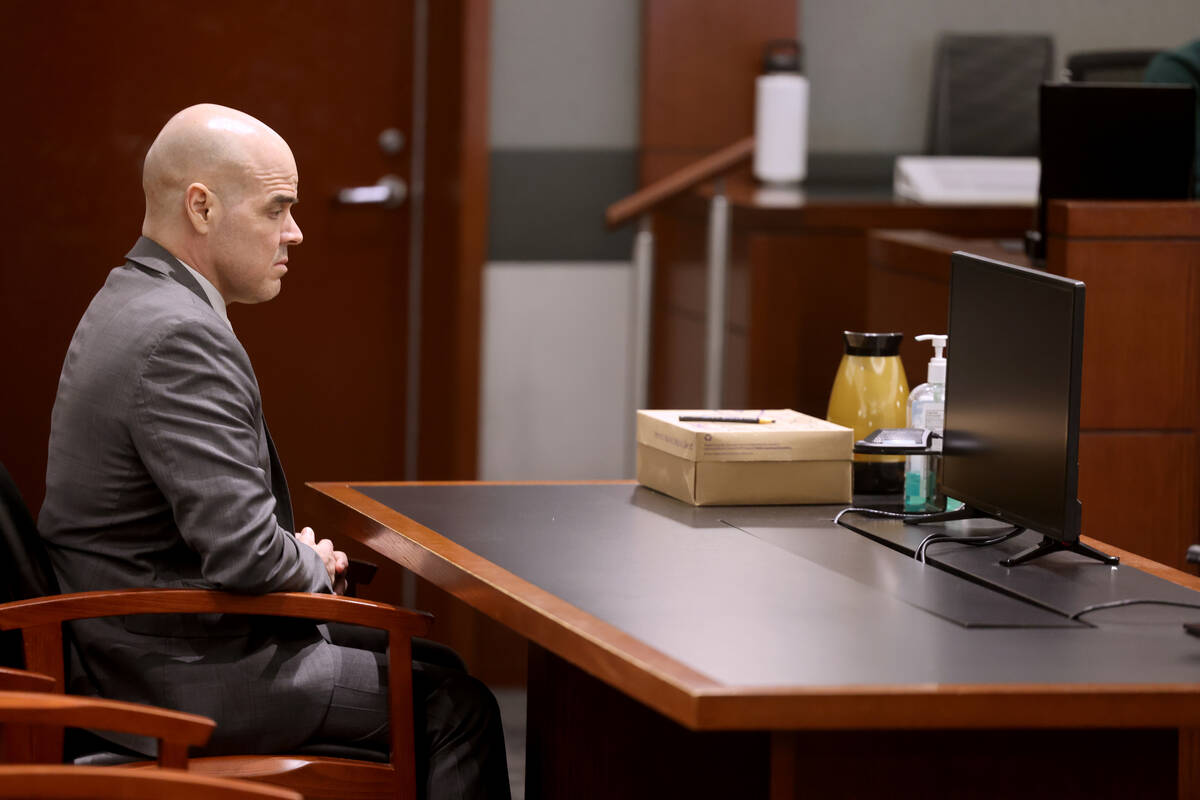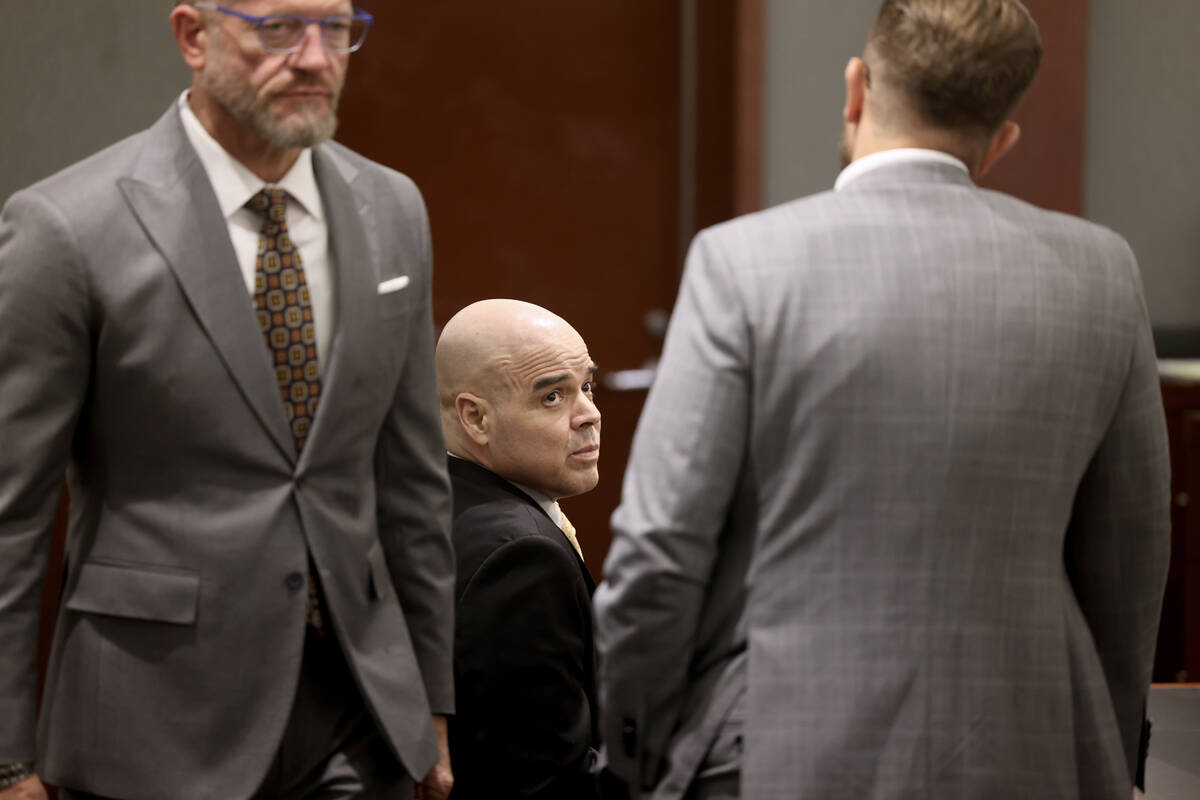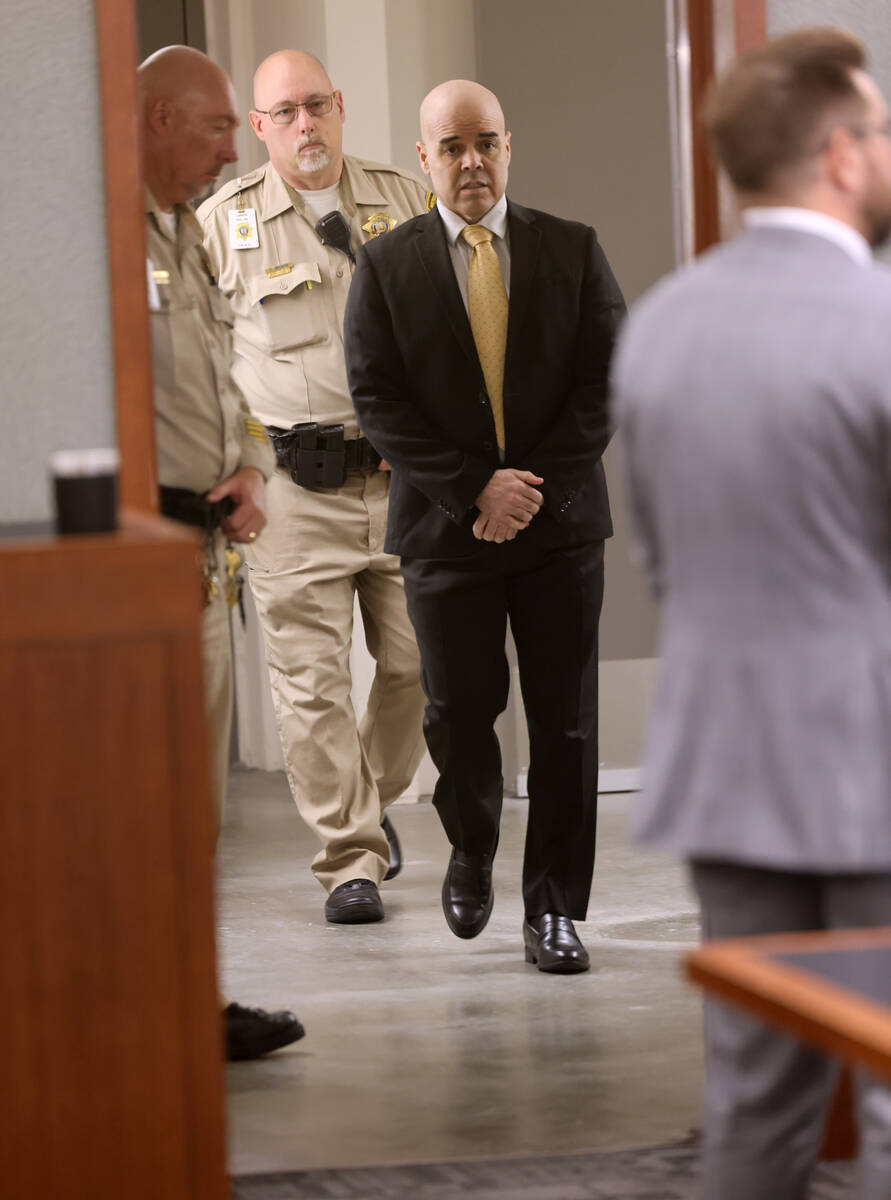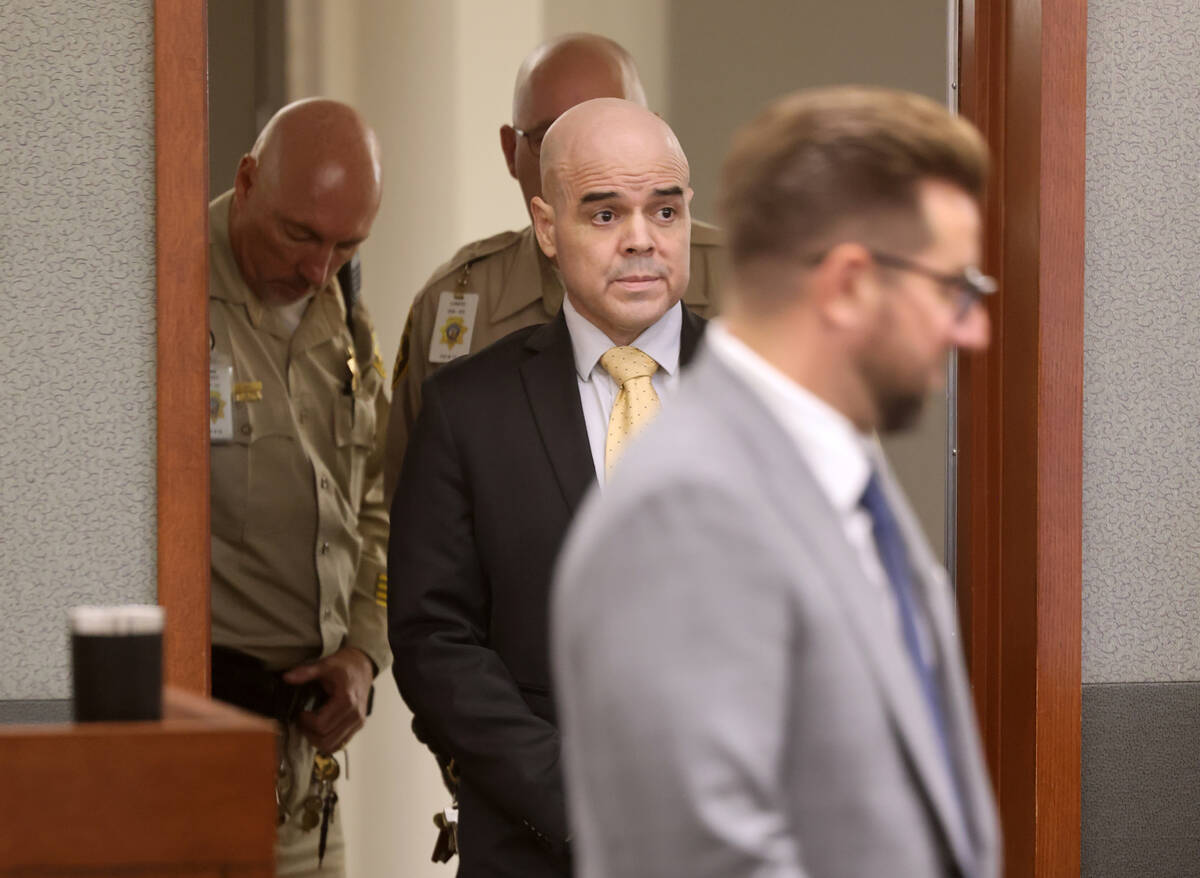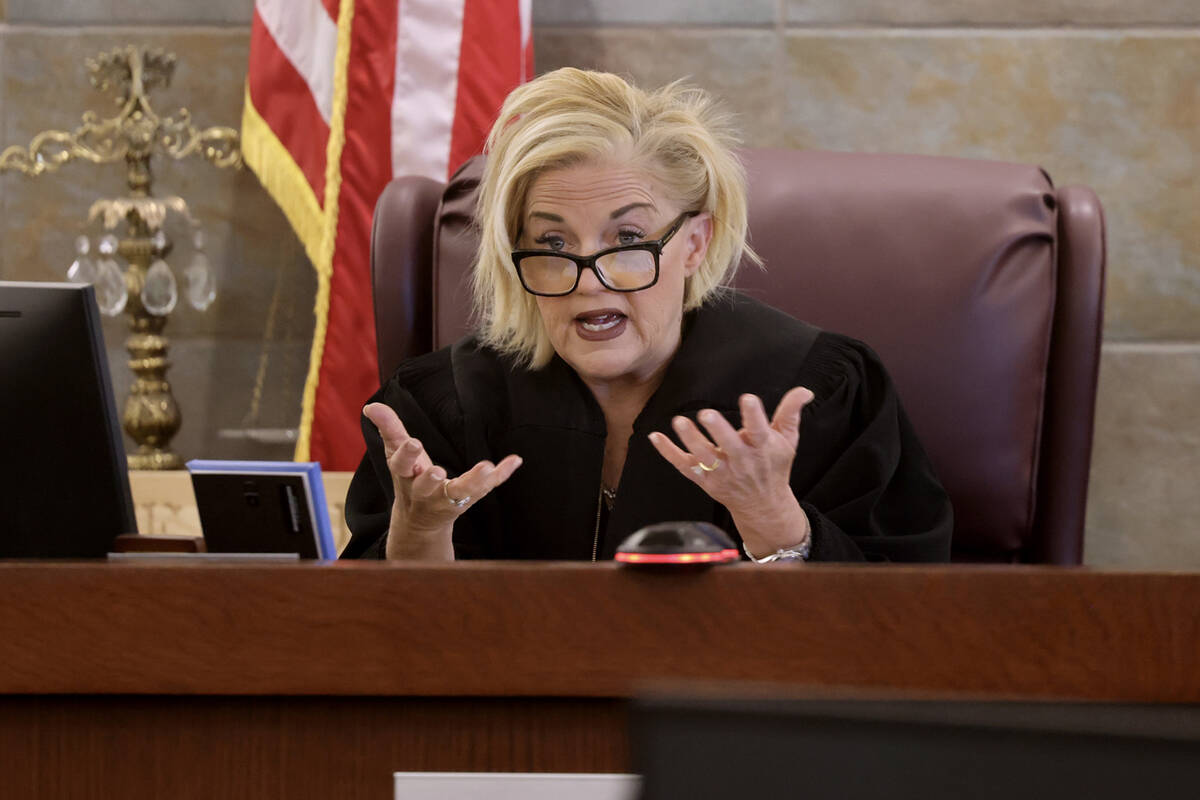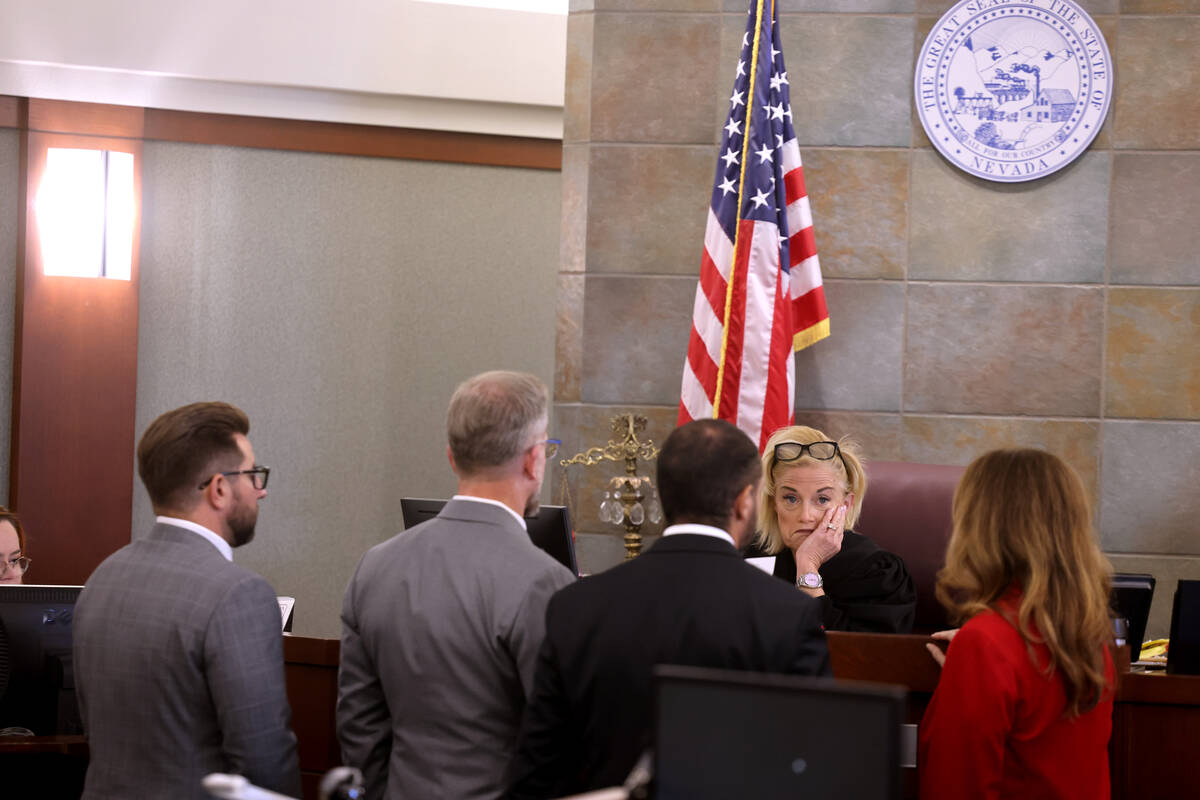Jury has questions, but no verdict in 2nd day of deliberations in Telles trial
For the second day in a row, jurors failed to reach a verdict in the murder trial of former Clark County Public Administrator Robert Telles, accused of killing Las Vegas Review-Journal investigative reporter Jeff German.
Just before 4:30 p.m. Tuesday, District Court spokeswoman Mary Ann Price said the jury had finished deliberations for the day, and would resume Wednesday morning. The panel of seven women and five men deliberated for more than four hours Monday and just under six hours Tuesday.
German’s family, employees from the Clark County public administrator’s office and groups of journalists sat outside the courtroom, waiting on metal benches as each hour crept by on Tuesday.
Aleisha Goodwin is one of the county employees who have been awaiting a verdict, as they sit together in the courthouse hallway wearing bright red shirts and pins showing German’s face.
“I thought it would be under an hour, I really did,” Goodwin told the Review-Journal on Tuesday afternoon, after it was announced the jury was leaving for a second day.
Goodwin said she believed that the DNA evidence in the case and the items found at Telles’ home would result in a quick verdict from the jury.
“We thought with all the evidence we knew about, it was a slam dunk, and then more stuff came out that we weren’t even aware of,” she said.
Telles’ defense attorney, Robert Draskovich, said he believes the long deliberations show that the jury is “very conscientious,” and that multiple days of deliberations is “clearly to the benefit of the defense.”
“This case has been portrayed as a slam-dunk case, and while the evidence was very strong, they weren’t close-minded to an alternative explanation,” Draskovich said.
Current Clark County Public Administrator Rita Reid, who also worked under Telles, told reporters that she and the other employees “believe that the right thing is going to be done.”
“It’s very, very difficult to wait, but we hope and pray and believe the jury’s doing their very best to review everything that they’ve been told,” she said.
Unanimous decision needed
Meanwhile, veteran defense attorneys said that more than two days of deliberations could be an unusual sign for a murder case in Nevada.
“I think they’re approaching a hung jury status,” said defense attorney and former prosecutor Robert Langford, who has handled high-profile murder cases.
The jury must reach a unanimous decision to declare Telles guilty or not guilty. If the jury tells District Judge Michelle Leavitt that they cannot reach a decision, then the judge could instruct the jury to continue deliberations through what is known as an Allen charge, defense attorneys said. A hung jury could also trigger a mistrial.
The jury posed several questions to the court both Monday and Tuesday. They’ve asked for help zooming in on video that Draskovich argued could show a different person was driving what officials said was the assailant’s GMC Yukon Denali. On Tuesday, the jury asked the court to point out which piece of evidence included “Jeff German news article videos about Mr. Telles,” and they asked to review a side-by-side video of Telles and the assailant walking.
The judge said the panel would not receive the specific side-by-side video assembled from existing evidence and used by prosecutors in closing arguments. The jury was also told to refer to the evidence to find exhibits they are searching for.
“It sounds like they’re actually doing their job,” defense attorney Jess Marchese said about the jury’s questions and length of deliberations.
Prosecutors have accused Telles of “lying in wait” for German outside the reporters home on Sept. 2, 2022, while wearing a large straw hat and an orange reflective vest. Neighborhood video surveillance captured a distant image of the assailant confronting German on the side of the journalist’s house. Prosecutors have said Telles killed German over articles the journalist had written about Telles’ conduct as the Clark County public administrator.
German’s articles on Telles covered accusations that he created a toxic work environment at the public administrator’s office, and carried on an “inappropriate” relationship with a staffer. Telles lost re-election a month after German first reported on him.
The state’s evidence against Telles included his own DNA found underneath German’s fingernails, plus surveillance footage and items found at his home matching the assailant’s clothing. Former Metropolitan Police Department detective Cliff Mogg testified about surveillance footage police believe shows Telles’ Yukon Denali leaving his neighborhood the morning German was killed, driving around German’s neighborhood, and then driving back toward Telles’ home.
Draskovich has tried to paint a picture of Telles as a public official who was trying to expose corruption within the public administrator’s office.
Telles told the jury he was looking into independent administrators in probate cases regarding property of people who died in Clark County. He alleged that the homes were being flipped for profit, without benefiting the families of the deceased, and that he was “fighting” Compass Realty &Management over the sales.
“Somebody framed me for this, and I believe it’s Compass Realty,” Telles said. “And I believe it’s for the work that I’ve done against them.”
The company has called his accusation “unconscionable and irresponsible.”
Attorneys on Monday gave closing arguments, in which Draskovich emphasized that the jury needs proof beyond a reasonable doubt to convict Telles. Meanwhile, prosecutors attempted to poke holes in Telles’ claim that he was framed by officials and the disgruntled real estate company.
Metropolitan Police Department detective Derek Jappe testified last week that he investigated Telles’ claim and that he found no evidence Telles received kickbacks, and the Clark County district attorney’s office determined there was not enough evidence for a prosecution in the alleged scheme.
In deliberation room
Defense attorney Christopher Oram said its hard for him to gauge when jury questions are beneficial for the defense or prosecution, although other attorneys said any delay is typically a good sign for the defense. Oram said a lengthy deliberation could indicate that one or two jurors have a different opinion than the rest of the panel.
He also emphasized it’s impossible to know what the jury is thinking.
“Maybe they want to be thorough,” he said.
Jonathan MacArthur, who has worked as a defense attorney for 24 years, said a long deliberation could show that jurors believe the case is nuanced. But as a defense attorney, MacArthur said he is “disappointed” in juries when they reach a verdict quickly.
“If it’s any shorter than three (hours), there’s shortcuts being taken, and it’s usually in the favor of the state,” MacArthur said.
Langford said he believes that the length of the deliberation, when considered with the state’s evidence, shows that someone in the jury room is arguing with the majority of the panel. But he also said it’s difficult to know what juries are thinking.
“Only fools and newcomers predict what juries are doing in the deliberation room,” he said.
Contact Katelyn Newberg at knewberg@reviewjournal.com or 702-383-0240.



